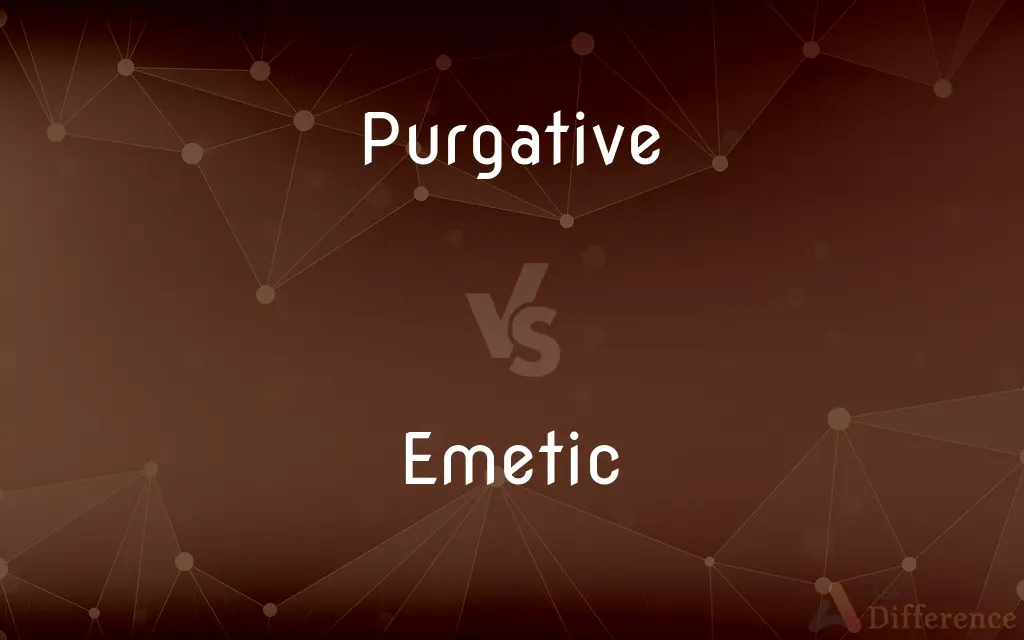Purgative vs. Emetic — What's the Difference?
Edited by Tayyaba Rehman — By Maham Liaqat — Updated on April 1, 2024
Purgatives are substances that induce bowel movements to relieve constipation, while emetics cause vomiting to expel contents from the stomach.

Difference Between Purgative and Emetic
Table of Contents
ADVERTISEMENT
Key Differences
Purgatives act on the intestines to stimulate or facilitate bowel movements, aiding in the relief of constipation or for bowel preparation before medical procedures. Emetics, in contrast, act on the stomach and brain's vomiting center to induce vomiting, often used in cases of poisoning or overdose to quickly remove ingested substances.
While purgatives are used to manage bowel health and constipation, they work by increasing the water content in the stool or stimulating the intestinal muscles. Emetics, however, are used in emergency situations to expel toxic substances from the stomach and must be used under medical supervision due to the risks of aspiration or damage to the esophagus.
Purgatives, ranging from mild to strong, can be natural like senna or synthetic like bisacodyl. Emetics like ipecac syrup, once common in homes for emergency use, are now less recommended due to potential complications and the preference for professional medical treatment in cases of poisoning.
The use of purgatives can be part of a regular health regimen for individuals with chronic constipation, under the guidance of a healthcare provider. Emetics are not meant for regular use and are reserved for specific, acute medical situations to prevent harm from toxic substances.
Purgatives and emetics serve different purposes in managing health and treating emergencies. While both can be crucial in certain medical contexts, their applications, mechanisms of action, and potential risks differ significantly.
ADVERTISEMENT
Comparison Chart
Primary function
Induce bowel movements
Induce vomiting
Action mechanism
Stimulate intestinal muscles, increase stool water content
Act on the stomach and brain's vomiting center
Common use cases
Constipation relief, bowel prep for procedures
Poisoning or overdose emergency treatment
Examples
Senna, bisacodyl, magnesium sulfate
Ipecac syrup, salt water
Usage frequency
Can be used as needed or as directed for chronic conditions
Only used in specific emergency situations
Compare with Definitions
Purgative
A substance that encourages bowel movements.
Magnesium sulfate is a purgative used to cleanse the intestines before a colonoscopy.
Emetic
A substance that induces vomiting.
In emergency situations, ipecac syrup was historically used as an emetic to treat certain poisonings.
Purgative
Medicinal agents used to relieve constipation.
Bisacodyl tablets are recommended as a purgative for occasional constipation.
Emetic
Agents used in medical emergencies to expel ingested toxins.
Activated charcoal may be administered alongside an emetic in cases of overdose.
Purgative
Agents for intestinal cleansing before medical examinations.
Patients are often prescribed a purgative to ensure a clear view during endoscopic procedures.
Emetic
Treatments for removing harmful substances from the stomach.
Emetics are sometimes used in emergency rooms to quickly clear the stomach of contaminants.
Purgative
Remedies that stimulate intestinal motility.
Herbal teas containing senna are used as natural purgatives to promote bowel movements.
Emetic
Products that act on the brain's vomiting center.
Emetic effects can be a side effect of some medications, necessitating careful monitoring.
Purgative
Compounds that increase stool water content.
Over-the-counter fiber supplements act as mild purgatives by absorbing water into the stool.
Emetic
Medicines that trigger the vomiting reflex.
Certain chemotherapy drugs can have an emetic effect, requiring anti-nausea medications to manage.
Purgative
Tending to cleanse or purge, especially causing evacuation of the bowels.
Emetic
Causing vomiting.
Purgative
A purgative agent or medicine; a cathartic.
Emetic
An agent that causes vomiting.
Purgative
(capable of) purging
Emetic
(pharmaceutical effect) Causing nausea and vomiting.
Purgative
Something, such as a substance or medicine, that purges; laxative
Emetic
(pharmaceutical drug) An agent that induces vomiting.
Purgative
Having the power or quality of purging; cathartic.
Emetic
Inducing to vomit; exciting the stomach to discharge its contents by the mouth.
Purgative
A purging medicine; stimulates evacuation of the bowels
Emetic
A medicine that induces nausea and vomiting
Purgative
Strongly laxative
Common Curiosities
How do purgatives work?
Purgatives work by stimulating intestinal muscles or increasing the water content in the stool to ease bowel movements.
What are alternatives to using purgatives for constipation?
Alternatives include dietary changes, increased water intake, and regular exercise.
What is the main purpose of a purgative?
To stimulate or facilitate bowel movements, often for constipation relief.
When are emetics used?
Emetics are used in emergencies to induce vomiting after ingestion of certain poisons or overdoses.
Are there natural purgatives?
Yes, natural purgatives include senna, castor oil, and certain high-fiber foods.
Are there side effects to using purgatives?
Side effects can include dehydration, electrolyte imbalance, and dependency with long-term use.
Is there a natural emetic?
Salt water and mustard water are traditional natural emetics but their use is not medically recommended due to safety concerns.
Can purgatives help with weight loss?
Using purgatives for weight loss is dangerous and can lead to serious health issues, including eating disorders.
What precautions should be taken when using an emetic?
Emetics should only be used under medical supervision to avoid complications.
Can emetics be used for food poisoning?
The use of emetics for food poisoning is controversial and generally not recommended; it's better to consult healthcare providers.
Can purgatives be used regularly?
Some mild purgatives can be used regularly for chronic constipation under medical advice.
Are emetics safe for home use?
The use of emetics at home, especially ipecac syrup, is now discouraged due to potential complications; it's advised to seek professional medical help in poisoning cases.
What are the risks of using emetics?
Risks include aspiration, damage to the esophagus, and imbalance of body salts, hence their use is limited to controlled situations.
How are purgatives and emetics different?
Purgatives induce bowel movements to relieve constipation, while emetics induce vomiting to expel stomach contents in emergency situations.
How quickly do emetics work?
Emetics usually work within minutes to induce vomiting, depending on the substance and the individual's condition.
Share Your Discovery

Previous Comparison
Container vs. Ink
Next Comparison
Fiber vs. FibrilAuthor Spotlight
Written by
Maham LiaqatEdited by
Tayyaba RehmanTayyaba Rehman is a distinguished writer, currently serving as a primary contributor to askdifference.com. As a researcher in semantics and etymology, Tayyaba's passion for the complexity of languages and their distinctions has found a perfect home on the platform. Tayyaba delves into the intricacies of language, distinguishing between commonly confused words and phrases, thereby providing clarity for readers worldwide.
















































